
Cleistanthus is a plant genus of the family Phyllanthaceae, tribe Bridelieae, first described as a genus in 1848. It is widespread in much of the Old World Tropics in Asia, Africa, Australia, and various oceanic islands. Cleistanthus collinus is known for being toxic and may be the agent of homicides or suicides.
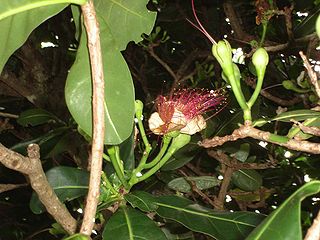
Barringtonia is a genus of flowering plants in the family Lecythidaceae first described as a genus with this name in 1775. It is native to Africa, southern Asia, Australia, and various islands of the Pacific and Indian Oceans. The genus name commemorates Daines Barrington.

Cyana is a genus of moths in the family Erebidae. Species are well distributed in Africa, Madagascar, China, India, Sri Lanka, Myanmar, Sumatra, Java and Borneo. The genus was erected by Francis Walker in 1854.
Labanda is a genus of moths of the family Nolidae erected by Francis Walker in 1859.
Pinacia is a genus of moths of the family Erebidae. The genus was erected by Jacob Hübner in 1831.

Numenes is a genus of tussock moths in the family Erebidae. The genus was erected by Francis Walker in 1855.

Ozola is a genus of moths in the family Geometridae first described by Francis Walker in 1861.
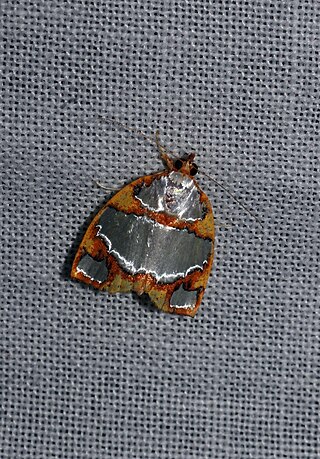
Titulcia is a genus of moths of the family Nolidae. The genus was erected by Francis Walker in 1864.

Zythos turbata is a moth of the family Geometridae first described by Francis Walker in 1862. It is found in southern Myanmar and on Borneo, Sumatra, Java, Peninsular Malaysia and the Philippines.
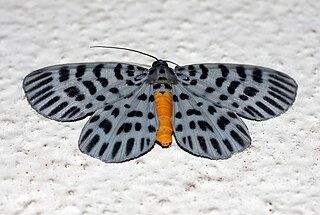
Bracca maculosa is a moth of the family Geometridae. It is found in Sumatra, Peninsular Malaysia, Borneo and Palawan.

Cyana effracta is a moth of the family Erebidae first described by Francis Walker in 1854. It is found in Nepal, the north-eastern Himalayas, Taiwan, China, Burma, Peninsular Malaysia, Sumatra and Borneo.
Scopula urnaria is a moth of the family Geometridae. It is found on Peninsular Malaysia, Borneo and Palawan. The habitat consists of lowland dipterocarp forests.

Zythos strigata is a moth of the family Geometridae first described by William Warren in 1896. It is found on Peninsular Malaysia, Borneo, Java, Bali and Palawan and Balabac Island in the Philippines.

Nyctemera muelleri is a moth of the family Erebidae first described by Vollenhoven in 1863. It is found on Sumatra, Peninsular Malaysia and Borneo, as well as in southern Myanmar, Thailand, Vietnam and the Philippines.
Gunda subnotata is a species of moth in the family Bombycidae. It was described by Francis Walker in 1859. It is found in Singapore and on Peninsular Malaysia, Sumatra, Borneo and Palawan. The habitat consists of both montane and lowland areas.
Relluna nurella is a moth in the family Cossidae, and the only species in the genus Relluna. It is found in the north-eastern Himalayas, as well as on Peninsular Malaysia, Borneo and Palawan.
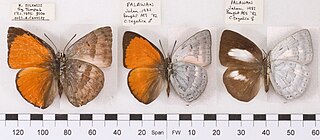
Curetis tagalica, the Southern Sunbeam, is a species of butterfly belonging to the lycaenid family. It is found in Southeast Asia.
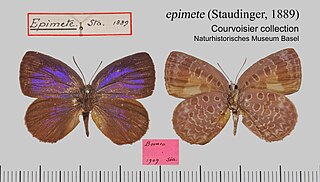
Arhopala epimete, the violetdisc oakblue, is a species of butterfly belonging to the lycaenid family described by Otto Staudinger in 1889. It is found in Southeast Asia.

Nepenthes malayensis, or the striped Malayan montane pitcher plant, is a large species of carnivorous tropical pitcher plant native and endemic to eastern mountains of Peninsular Malaysia. The peristomes on both upper and lower pitchers are profusely adorned by reddish bands, or stripes, making the species rather attractive. It grows close to mountain summits around 800–1000 m above sea level in partially shaded areas, though some individuals have been seen striving in open areas. The species was first observed in 2018 and initially thought to be conspecific with N. sanguinea. Nepenthes malayensis formal description was published in late 2020 in Kew Bulletin and it is one of the latest three new Malayan species described in the same year. These discoveries have made Peninsular Malaysia home to 15 species of Nepenthes and there are over 150 species of world's Nepenthes with the majority of these are from the Malay Archipelago.














